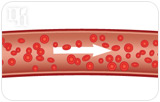You've probably been warned about the negative aspects of estrogen therapy, but not much good makes the headlines about this treatment anymore. Although it is risky and your doctor is correct if they encourage you to seek relief from menopausal symptoms from the least invasive options before the most invasive, estrogen therapy is still prescribed to certain women for a reason.

Estrogen replacement therapy (ERT) was designed to supplement lacking natural estrogen levels in the body with synthesized estrogen. When a woman enters menopause, her body no longer produces the amount of estrogen that it is accustomed to and, as a result, a woman may experience many physical and mental side effects. The idea behind ERT is that by raising estrogen levels to what they once were, symptoms will disappear. For most women who are prescribed estrogen, doctors will prescribe them progesterone to take alongside it. Aside from feeling better, there are other incentives for choosing hormone replacement therapy (HRT). Keep reading to discover the benefits.
Reasons Doctors Prescribe ERT
Doctors don't generally suggest women take hormone therapy for a prolonged period of time in postmenopause. There are potential benefits, in some cases, for short-term use of estrogen during menopause; however, these are not applicable to premenopause and postmenopause:
- Lower risk of osteoporosis. Studies show that ERT can help to prevent the bone loss associated with declining levels of estrogen.
- Decreased risk of colorectal cancer
- Heart disease prevention. Recent and unfinished studies may suggest a decreased risk of heart disease in women who are given estrogen therapy in the early stages of postmenopause.
Who Is a Good Candidate for ERT?

Estrogen hormone therapy is still prescribed to women because it has been proven to alleviate some menopausal symptoms, which cannot be said for every alternative remedy. ERT isn't right for everyone, but it is right for some people. You may be an ideal candidate if you:
- Have severe hot flashes along with other disturbing menopause symptoms.
- Other treatments are not available to you and you are experiencing rapid bone loss.
- Have stopped having periods or lost normal ovarian function before the age of 40.
For More Information
Talk to your doctor about the criteria for an ideal HRT patient. In some women, the benefits may outweigh the risks. Women who experience different levels of symptom intensity at different times during their transition have distinctive health risks. ERT may be right for you.


